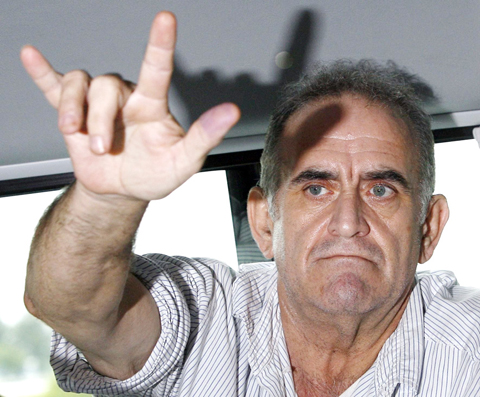US Senator Jim Webb said yesterday he had asked Myanmar to free opposition leader Aung San Suu Kyi and let her take part in politics during talks that secured the release of an American jailed for visiting her.
The Democratic senator landed in Bangkok, Thailand, with John Yettaw, whose swim to Suu Kyi’s home in May led to her renewed detention after authorities said his uninvited stay had breached the terms of her house arrest.
He had met junta leader Than Shwe at the remote new capital of Naypyidaw on Saturday and then flown to Yangon to meet Suu Kyi at a guest house.

PHOTO: EPA
Suu Kyi was sentenced last week to another 18 months under house arrest and Yettaw’s action was widely seen as giving the junta a pretext to keep Suu Kyi out of politics until after an election due next year. Webb said he had raised the issue.
“I’m hopeful as the months move forward they will take a look,” he said.
“With the scrutiny of the outside world judging their government very largely through how they are treating Aung San Suu Kyi, it’s to their advantage that she’s allowed to participate in the political process,” he said.
“What I said to the leaders of Myanmar is that I believe that it will be impossible for the rest of the world to believe the elections were free and fair if she was not released,” he said.
He said the US stood ready to help Myanmar.
Yettaw was not at the news conference. He went immediately to hospital after landing in Bangkok, where he walked from the plane to a waiting vehicle with a steadying hand from officials. He spent several days in hospital this month in Yangon.
Yettaw had been sentenced to seven years’ hard labor on three charges, including immigration offenses.
“I believe what happened was regrettable,” Webb said. “He was trying to help. He’s not a mean-spirited human being.”
Webb was allowed by the military authorities to speak with Suu Kyi for about 45 minutes on Saturday, after meeting members of her National League for Democracy and other political parties who had been invited to Naypyidaw by the government.
Some in Myanmar remained bitter at the treatment of Suu Kyi.
“The most tangible outcome of his visit is the release of John Yettaw, who caused the mess,” said Thakhin Chan Tun, a former ambassador to North Korea.
“However, Daw Aung San Suu Kyi, who is completely innocent in this incident, is still under house arrest,” he said.

LIMITS: While China increases military pressure on Taiwan and expands its use of cognitive warfare, it is unwilling to target tech supply chains, the report said US and Taiwan military officials have warned that the Chinese People’s Liberation Army (PLA) could implement a blockade within “a matter of hours” and need only “minimal conversion time” prior to an attack on Taiwan, a report released on Tuesday by the US Senate’s China Economic and Security Review Commission said. “While there is no indication that China is planning an imminent attack, the United States and its allies and partners can no longer assume that a Taiwan contingency is a distant possibility for which they would have ample time to prepare,” it said. The commission made the comments in its annual

DETERMINATION: Beijing’s actions toward Tokyo have drawn international attention, but would likely bolster regional coordination and defense networks, the report said Japanese Prime Minister Sanae Takaichi’s administration is likely to prioritize security reforms and deterrence in the face of recent “hybrid” threats from China, the National Security Bureau (NSB) said. The bureau made the assessment in a written report to the Legislative Yuan ahead of an oral report and questions-and-answers session at the legislature’s Foreign Affairs and National Defense Committee tomorrow. The key points of Japan’s security reforms would be to reinforce security cooperation with the US, including enhancing defense deployment in the first island chain, pushing forward the integrated command and operations of the Japan Self-Defense Forces and US Forces Japan, as

IN THE NATIONAL INTEREST: Deputy Minister of Foreign Affairs Francois Wu said the strengthening of military facilities would help to maintain security in the Taiwan Strait Japanese Minister of Defense Shinjiro Koizumi, visiting a military base close to Taiwan, said plans to deploy missiles to the post would move forward as tensions smolder between Tokyo and Beijing. “The deployment can help lower the chance of an armed attack on our country,” Koizumi told reporters on Sunday as he wrapped up his first trip to the base on the southern Japanese island of Yonaguni. “The view that it will heighten regional tensions is not accurate.” Former Japanese minister of defense Gen Nakatani in January said that Tokyo wanted to base Type 03 Chu-SAM missiles on Yonaguni, but little progress

NO CHANGES: A Japanese spokesperson said that Tokyo remains consistent and open for dialogue, while Beijing has canceled diplomatic engagements A Japanese official blasted China’s claims that Japanese Prime Minister Sanae Takaichi has altered Japan’s position on a Taiwan crisis as “entirely baseless,” calling for more dialogue to stop ties between Asia’s top economies from spiraling. China vowed to take resolute self-defense against Japan if it “dared to intervene militarily in the Taiwan Strait” in a letter delivered Friday to the UN. “I’m aware of this letter,” said Maki Kobayashi, a senior Japanese government spokeswoman. “The claim our country has altered its position is entirely baseless,” she said on the sidelines of the G20 summit in Johannesburg on Saturday. The Chinese Ministry